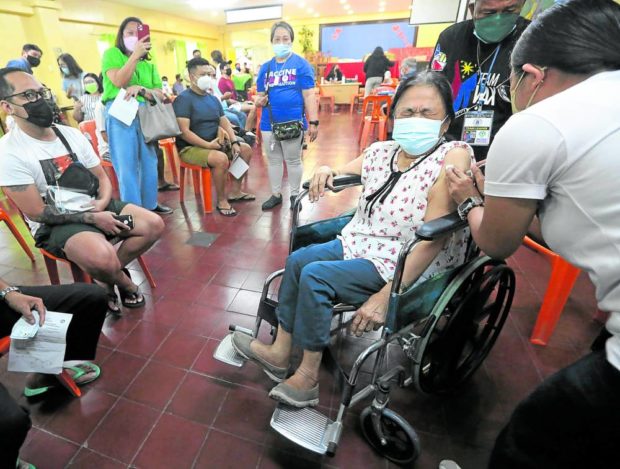
THIRD SHOT A senior citizen conquers her fear of injection needles and gets her COVID-19 booster shot at Justo Lukban Elementary School in Manila on Tuesday, the second day of the government inoculation rollout for the elderly, health workers and immunocompromised people who are eligible for a third shot.—MARIANNE BERMUDEZ
Despite easing community restrictions and reopening the economy, the Department of Health (DOH) remains hopeful that the country will not see spikes in COVID-19 infections similar to what has happened in Europe.
“Hopefully that will not happen to us. That’s why we’re giving early warnings on what has been happening in other countries so that we won’t reach a similar situation,” Health Undersecretary Maria Rosario Vergeire said at a press briefing on Monday.
In recent weeks, a number of European countries have been reporting a resurgence of COVID-19 infections.
“At the country level, Slovenia, Austria, Czech Republic and the Netherlands have the steepest increase in cases in the recent weeks. Cases in these countries have reached new peaks since the beginning of the pandemic.
Vergeire said loosening restrictions and requirements for minimum public health standards appeared to be the main reasons for the rise in COVID-19 cases in the European countries.
“One of the major difference [with Europe] is that when they relaxed restrictions, they included the removal of minimum public health standards, like wearing of mask and others,” she said.
“Here in our country, through the months from the start of the pandemic, we have seen how the behavior of our kababayan have improved in terms of wearing of mask, frequent hand washing, physical distancing, etc.,” she added.
Vergeire cited England, which removed mask mandates on July 19 despite having a four-week moving average of more than 200,000 cases that week.
“The UK, however, does not plan to bring back COVID-19 restrictions at present as the country transitions to learning to live with the virus,” Vergeire said.
In the Netherlands, most restrictions, including mask mandates, were also lifted in June as long as social distancing of 1.5 meters is followed, she added.
Vergeire reiterated her appeal to the public: “Let us all continue to comply with the minimum public health standards, safety protocols so that we can be able to sustain the low risk level of the country.”
Nevertheless, the health official stressed that the country must continue to be prepared in the event of such a surge.
“We are continuously increasing the capacity of each local government into employing different strategies, such as granular lockdowns, alert level system, and increasing vaccination coverage,” Vergeire said.
Meanwhile, the DOH on Tuesday recorded 1,153 new COVID-19 cases, bringing the nationwide tally to 2,827,820.
The country’s COVID-19 positivity rate was at 2.3 percent, slightly lower than the 2.8 percent positivity rate recorded on Monday.
The new cases brought the country’s active case count to 18,721, of which 55.2 percent are mild, 20.51 percent are moderate, 4.7 percent are asymptomatic, 13.8 percent are severe, and 5.8 percent are in critical condition.
The active cases account for 0.7 percent of the COVID-19 cases in the country.
The DOH also reported that 2,182 people recovered from the respiratory illness, bringing the total number of recoveries to 2,761,617.
The death toll climbed to 47,482 with 195 new fatalities.
Based on the latest case bulletin, two laboratories were not operational since Nov. 21, while eight laboratories failed to submit data to the COVID-19 Document Repository System.